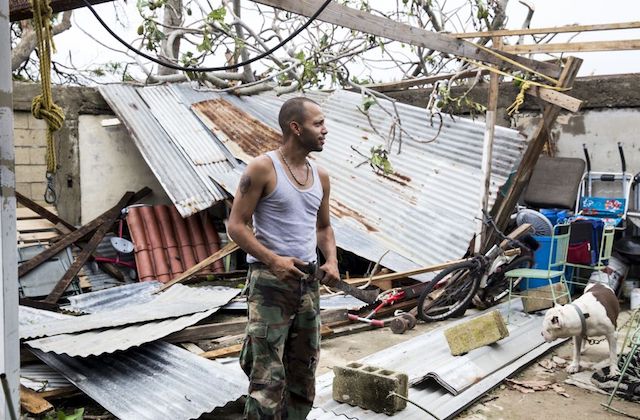In five weeks, the 2018 hurricane season will begin, and predictions are that there will be an above-average number of storms. But residents of Houston and Puerto Rico are still experiencing the catastrophic effects of last hurricane season.
A new article in the Houston Chronicle details how nearly 1,400 Texans who were displaced by Hurricane Harvey were informed by the Federal Emergency Management Agency (FEMA) that they must move out of their FEMA-funded hotels next month. Agency officials say there are enough rentals available for them to occupy throughout Houston, so it’s unnecesary for them to live in rooms paid for by FEMA.
“If you happen to be living in a county that does have the resources for rental, then we would prefer you to stop [sic] renting because the hotel assistance is just a short-term, interim assistance,” FEMA spokesperson Tobe Nguyen told the Houston Chronicle. “Houston is starting to rebuild, so there are other resources, apartments and rentals that are available, so that’s why they should be moving forward to go back and rent.”
Homeowners have been given a deadline of May 31 to vacate FEMA-funded hotels, while renters must be out by by Tuesday (May 1).
Hurricane Harvey hit Houston on August 25. As Colorlines previously reported, the storm was most catastrophic for Houston’s communities of color. The neighborhoods where they typically live are located in low-lying areas that are prone to flooding and near petrochemical plants of superfund sites that tend to overflow during storms.
Though the city is rebuilding, the Houston Chronicle detailed the lives of many residents who have depleted their savings as a result of not being able to work after the storm. These men and women do not have the money for a downpayment on a rental or for repairs on Harvey-damaged homes.
“This tight deadline for people is a real problem, especially for low-income people,” Zoe Middleton, spokeswoman for the nonprofit advocacy group Texas Housers, told the publication. “It’s enormously stressful for people that are already in a stressful situation, and when there’s no affordable housing supply for people to go to. Once their hotel voucher is terminated, people are really up in the air.”
As Houstonians grapple with housing concerns as a new hurricane season approaches, people in Puerto Rico are still reeling from the effects of Hurricane Maria, which hit on September 20. The entire island was plunged into darkness when the the storm destroyed the electrical grid. While work continues to repair the grid, there continue to be setbacks—on April 18, the island once again experienced a total blackout. Now, San Juan Mayor Carmen Yulín Cruz fears there may be significant consequences in the quest to rebuild Puerto Rico.
Per ThinkProgress:
rnt
As she wages her fight for more generous support post-Maria, Cruz said she is also trying to prevent the wholesale adoption on the island of what she calls “disaster economics”—the bid to privatize reconstruction, and much of the social fabric on the island as well.
t
“Disaster economics is using privatization as a means to strip Puerto Ricans of their right to ensure that essential services are democratically distributed,” she said last week in an interview with ThinkProgress. “We have to ensure that we understand what our priorities are.”
Privatization efforts in the wake of Hurricane Maria could include schools and electricity. “If energy is privatized, what do you think will happen to a very, very small town in the middle of Puerto Rico that has very few inhabitants? It’s not going to be cost effective to supply them with power,” Cruz told ThinkProgress, adding, “I believe it has been widely acknowledged by the world that the [U.S.] response to Puerto Rico was unfair, was irresponsible, was inadequate and it cost lives.”
Puerto Rico Governor Ricardo Roselló signed a bill to implement a charter school pilot program for 10 percent of the island’s public schools, and private school vouchers for three percent of students, as part of an education overhaul starting in the 2019-2020 school year. In addition, on April 5, Puerto Rico’s Department of Education announced it would close 283 public schools.
The 2018 hurricane season runs from June 1 through November 30.
